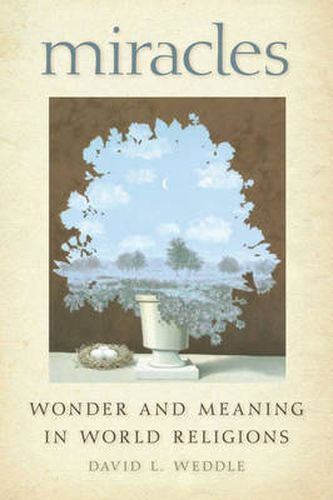Readings Newsletter
Become a Readings Member to make your shopping experience even easier.
Sign in or sign up for free!
You’re not far away from qualifying for FREE standard shipping within Australia
You’ve qualified for FREE standard shipping within Australia
The cart is loading…






Flying yogis, mind-reading rabbis, levitating monks, saints who converse with animals, healers who restore sight to the blind and make the lame walk. Miracles are signs whose meanings emerge from the specific cultural contexts and religious traditions in which they occur, yet across religions they serve as expressions of a common faith that the horizon of possibilities for human life is not restricted to closed systems of material forces. Despite the dominance of scientific explanation in the modern world, at the beginning of the twenty-first century faith in miracles remains strong, particularly in resurgent forms of traditional religion. In Miracles , David L. Weddle examines how five religious traditions - Hinduism, Judaism, Buddhism, Christianity, and Islam - understand miracles, considering how they express popular enthusiasm for wondrous tales, how they provoke official regulation because of their potential to disrupt authority, and how they are denied by critics within each tradition who regard belief in miracles as an illusory distraction from moral responsibility. In dynamic and accessible prose, Weddle shows us what miracles are, what they mean, and why, despite overwhelming scientific evidence, they are still significant today: belief in miracles sustains the hope that, if there is a reality that surpasses our ordinary lives, it is capable of exercising - from time to time - creative, liberating, enlightening, and healing power in our world.
$9.00 standard shipping within Australia
FREE standard shipping within Australia for orders over $100.00
Express & International shipping calculated at checkout
Flying yogis, mind-reading rabbis, levitating monks, saints who converse with animals, healers who restore sight to the blind and make the lame walk. Miracles are signs whose meanings emerge from the specific cultural contexts and religious traditions in which they occur, yet across religions they serve as expressions of a common faith that the horizon of possibilities for human life is not restricted to closed systems of material forces. Despite the dominance of scientific explanation in the modern world, at the beginning of the twenty-first century faith in miracles remains strong, particularly in resurgent forms of traditional religion. In Miracles , David L. Weddle examines how five religious traditions - Hinduism, Judaism, Buddhism, Christianity, and Islam - understand miracles, considering how they express popular enthusiasm for wondrous tales, how they provoke official regulation because of their potential to disrupt authority, and how they are denied by critics within each tradition who regard belief in miracles as an illusory distraction from moral responsibility. In dynamic and accessible prose, Weddle shows us what miracles are, what they mean, and why, despite overwhelming scientific evidence, they are still significant today: belief in miracles sustains the hope that, if there is a reality that surpasses our ordinary lives, it is capable of exercising - from time to time - creative, liberating, enlightening, and healing power in our world.